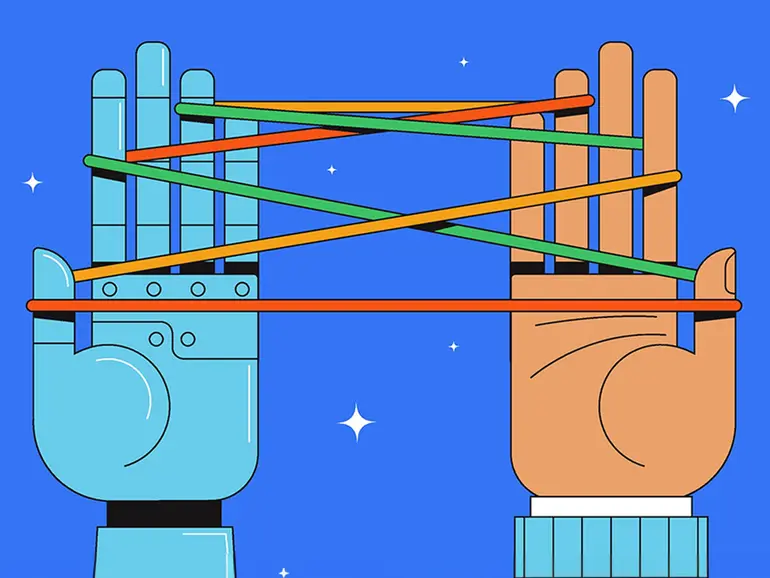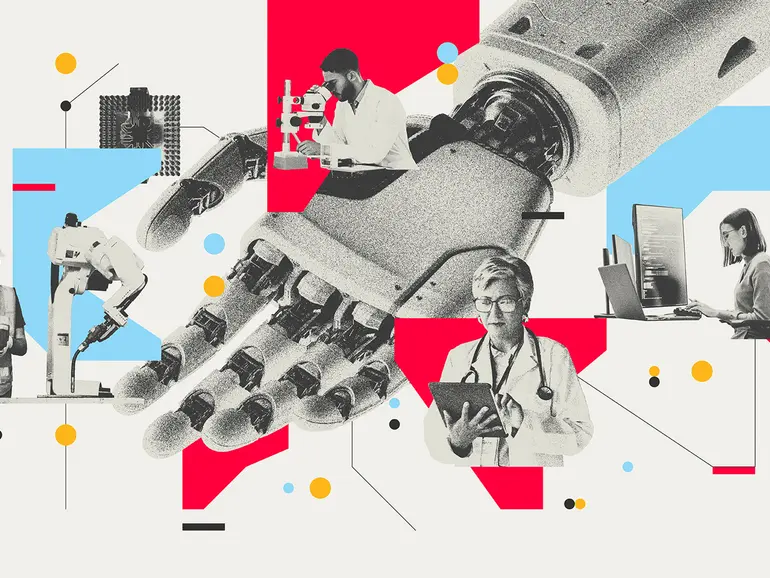How to boost pro-worker AI in your company
As AI capabilities advance, the window for shaping whether the technology augments or replaces workers is narrowing. Decision makers need to step up, MIT researchers say.

Faculty
Daron Acemoglu is an Institute Professor of Economics in the Department of Economics at the Massachusetts Institute of Technology and also affiliated with the National Bureau Economic Research, and the Center for Economic Policy Research.
In 2024, Acemoglu received the Sveriges Riksbank Prize in Economic Sciences in memory of Alfred Nobel, joint with Simon Johnson and James A. Robinson, “for studies of how institutions are formed and affect prosperity.”
He is an elected Fellow of the National Academy of Sciences, the British Academy, the American Philosophical Society, the Turkish Academy of Sciences, the American Academy of Arts and Sciences, the Econometric Society, the European Economic Association, and the Society of Labor Economists.
Daron Acemoglu received a BA in economics from the University of York, 1989, an MSc in mathematical economics and econometrics from the London School of Economics, 1990, and a PhD in economics from the London School of Economics in 1992. Since 1993, he has held the academic positions of Lecturer at the London School of Economics, and Assistant Professor, Pentti Kouri Associate Professor, and Professor of Economics at MIT.
He is the author of six books: Economic Origins of Dictatorship and Democracy (with James A. Robinson), Introduction to Modern Economic Growth, Why Nations Fail: The Origins of Power, Prosperity and Poverty (with James A. Robinson), Principles of Economics (with David Laibson and John List), The Narrow Corridor: States, Societies, and the Fate of Liberty (with James A. Robinson), and Power and Progress: Our Thousand-Year Struggle Over Technology and Prosperity (with Simon Johnson).
His academic work has been published in leading scholarly journals, including the American Economic Review, Econometrica, Journal of Political Economy, Quarterly Journal Economics and Review of Economic Studies. His research covers a wide range of areas within economics, including political economy, economic development and growth, human capital theory, growth theory, innovation, search theory, network economics and learning.
Daron Acemoglu has received numerous awards and fellowships, including the inaugural T. W. Shultz Prize from the University of Chicago in 2004, and the inaugural Sherwin Rosen Award for outstanding contribution to labor economics in 2004; Distinguished Science Award from the Turkish Sciences Association in 2006; the John von Neumann Award, Rajk College, Budapest in 2007; the Carnegie Fellowship in 2017; the Jean-Jacques Laffont prize in 2018; the Global Economy Prize in 2019; and the CME Mathematical and Statistical Research Institute prize in 2021.
He was awarded the John Bates Clark Medal in 2005, given every two years to the best economist in the United States under the age of 40 by the American Economic Association; the Erwin Plein Nemmers prize awarded every two years for work of lasting significance in economics in 2013; and the 2016 BBVA Frontiers of Knowledge award in economics.
He holds Honorary Doctorates from the University of Utrecht, the Bosporus University, University of Athens, Bilkent University, the University of Bath, the Ecole Normale Superieure, Scaly Paris, and the London Business School.
His book (joint with James A. Robinson) Economic Origins of Dictatorship and Democracy received the Association of American Publishers Award for Professional and Scholarly Excellence, and the William Riker Prize for Best Book Published in Political Economy, the Woodrow Wilson Foundation Award for Best Book Published on Government, Politics or International Affairs. Why Nations Fail also received several prizes and awards, and was a New York Times bestseller in 2012.
His new book, Power and Progress: Our Thousand-Year Struggle Over Technology and Prosperity (joint with Simon Johnson) was published in May 2023.
Acemoglu, Daron. Economic Policy Vol. 40, No. 121 (2025).
Acemoglu, Daron and Simon Johnson, Working Paper. May 2024. NBER Working Paper No. 32416.
Capraro, Valerio, Austin Lentsch, and Daron Acemoglu et al., Working Paper. December 2023.
Acemoglu, Daron and Simon Johnson. New York, NY: PublicAffairs/Hachette Book Group, 2023.
Acemoglu, Daron. MIT Press, 2021.
Daron Acemoglu, Andrea Manera, and Pascual Restrepo. In MIT Work of the Future, Research Brief, Cambridge, MA: September 2020.

As AI capabilities advance, the window for shaping whether the technology augments or replaces workers is narrowing. Decision makers need to step up, MIT researchers say.

To realize the greatest gains from artificial intelligence, we must make the future of work more human, not less.
Institute Professor Daron Acemoglu argued that while Trump's authoritarian tendencies are weakening the country's institutions, the president is not the root cause of the broader structural problems. "If we go down this path of destroying jobs and creating more inequality, U.S. democracy is not going to survive," he said.
Emerging data has led economists to wonder when — or if — AI will offer a return on corporate investments. A 2024 MIT study found a modest 0.5% increase in productivity over the next decade. "I don't think we should belittle 0.5% in 10 years. That's better than zero," study author Institute Professor Daron Acemoglu said. "But it's just disappointing relative to the promises that people in the industry and in tech journalism are making."
Institute Professor Daron Acemoglu joined the "BBC World Business Report" to examine whether the tech bubble could be set to burst. "While AI remains a very promising, very versatile technology, the huge amount of investment that we are seeing is not translating into revenue and it's not clear how it will translate into revenue," he said.
Institute Professor Daron Acemoglu wrote: "By granting ICE agents de facto immunity, the Trump administration has given them a green light to ratchet up their violent tactics. If this violence goes unchecked, it could indeed be a turning point, because it will create a template for other security forces more closely aligned with Trump to use force against any manifestation of opposition."